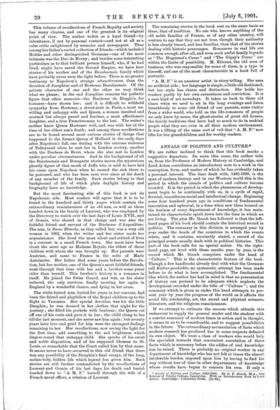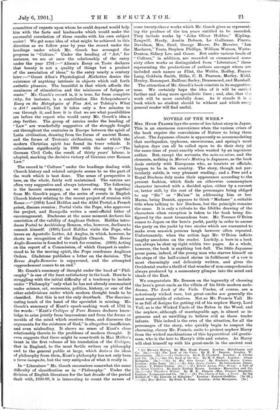ANNALS OF POLITICS AND CULTURE.*
WE are rather inclined to think that this book marks a suggestive departure. Its main idea came, the author tells us, from the Professor of Modern History at Cambridge, and Lord Acton contributes an introductory note to a work in the conception, form, and matter of which he has evidently taken a personal interest. The time dealt with, 1492-1899, is the span of modern history, and in our Western world this is the period in which the annals of politics and culture become crowded. It is the period in which the phenomena of develop- ment begin to be continually with us, in a cycle of rapid, feverish, tumultuous social and intellectual change. Beginning some four hundred years ago in conditions of fundamental innovation and upheaval, in a time when new ideas loomed on the horizon of every department of knowledge, it has main- tained its characteristic spirit down into the time in which we are living. The plan Mr. Gooch has followed is that the left- hand pages of his book should contain the historical record in politics. The summary in this division is arranged year by year under the heads of the countries to which the events relate, and it contains, succinctly stated, a record of the principal events usually dealt with in political histories. This part of the book calls for no special notice. On the right- hand page, set level with these results year by year, is the record which Mr. Gooch comprises under the bead of " Culture." This is the characteristic feature of the book. Though a few handbooks already deal with what the Germans call Kultur-geschichte, no systematic attempt has been made before to do what is here accomplished. The fundamental idea which the author has had in mind is that no presentation of history can pretend to be adequate which neglects the development recorded under the title of " Culture " ; and the summary which is given us under this head attempts to pre- sent year by year the progress of the world as it affects the social life, scholarship, art, the moral and physical sciences, literature, and the religious consciousness.
If we attempt to estimate the success which attends this endeavour to supply the general reader and the student with a concise summary of modern times in action and in thought, it seems to us to be considerable, and to suggest possibilities in the future. The extraordinary accumulation of facts which modern research has produced has in some respects defeated its own object. We want a class of workers who would help the specialist towards that convenient correlation of these facts which is necessary before the edifice of real knowledge can be raised. There is probably no original worker in any department of knowledge who has not felt at times the almost intolerable burden imposed upon him by having to find his way without loss of time in other departments of knowledge whose results have begun to concern his own. If only a • Annals of Politics and Culture (1402-1896). By G. P. Gooch, M.A., late Scholar of Thnity College, Cambridge. With an Introductory Note by Lord Acton. Cambridge : University Press. [7s. 6d.] committee of experts upon whom he could depend would help him with the facts and landmarks which would make the successful correlation of these results with his own subject easier ! We get some idea of what might be achieved in this direction as we follow year by year the record under the headings under which Mr. Gooch has arranged the progress in " Culture." Under the heading of " Art," for instance, we see at once the relationship of the entry under the year 1791 :—" Alison's Essay on Taste declares that beauty is not a quality of things but a product of the association of ideas," to the entry nearly a century later :—" Grant Allen's Physiological ...Esthetics denies the existence of anything intrinsic in objects which call forth esthetic pleasure. The beautiful is that which affords the maximum of stimulation and the minimum of fatigue or waste." Mr. Gooch's record is, it is true, far from complete (why, for instance, is a contribution like Schopenhauer's Essay on the Metaphysics of Fine Art, or Tolstoy's What is Art ? omitted P), but it takes only a few minutes to run through it, and here it is that we see what possibilities are before the expert who would carry Mr. Gooch's idea a step further. The group of entries under the beading of "Law" are wonderfully suggestive of the struggle fought out throughout the centuries in Europe between the spirit of Latin civilisation, drawing from the forms of ancient Rome, and the forms of Teutonic civilisation, under which the modern Christian spirit bas found its truer vehicle. It culminates significantly in 1896 with the entry :—" The German Civil Code, the result of thirty years' labour, is adopted, marking the decisive victory of German over Roman Law."
The record in " Culture " under the headings dealing with Church history and related subjects seems to us the part of the work which is best done. The sense of perspective is here, on the whole, fairly well maintained. The entries are often very suggestive and always interesting. The following is the laconic summary, as we have strung it together from Mr. Gooch's pages, of the series of events in English Church history relating to the recent project of reunion with Rome :—" (1894) Lord Halifax and the Abbe Portal, a French priest, discuss reunion; Portal visits the Pope, who approves the project, and Rampolla writes a semi-official letter of encouragement. Duchesne at the same moment declares his conviction of the validity of Anglican Orders. Halifax intro- duces Portal to Archbishop Benson, who, however, declines to commit himself. (1895) Lord Halifax visits the Pope, who issues an Apostolic Letter, Ad Anglos, in which, however, he shows no recognition of the English Church. The Revue Anglo-Romaine is founded to work for reunion. (1896) Acting on the report of a Commission, of which Gasquet is under- stood to be the moving spirit, the Pope condemns Anglican Orders. Gladstone publishes a letter on the decision. The Revue Anglo-Romaine is suppressed, and the attempted rapprochement comes to an end:' Mr. Gooch's summary of thought under the head of "Phil- osophy" is one of the least satisfactory in the book. Here he is struggling with the initial difficulty of a tendency to include under "Philosophy" only what he has not already summarised under science, art, economics, politics, history, or one of the other subdivisions under which modern thought tends to be classified. But this is not the only drawback. The discrimi- nating touch of the hand of the specialist is missing. Mr. Gooch's summary of Kant's epoch-making work of 1782 in the words : " Kant's Critique of Pure Reason declares know- ledge to arise jointly from impressions and from the forms or moulds of the mind which receives them, and discusses the arguments for the existence of God," is altogether insufficient, and even misleading. It shows no sense of Kant's close relationship therein to the problems of modern thought. It even suggests that there might be some truth in Max Miiller's taunt in the first volume of his translation of the Critique, that in England, to the most fertile writers on philosophy and to the general public at large, which derives its ideas of philosophy from them, Kant's philosophy has not only been a terra incognita, but the very antipodes of what it really is.
In " Literature " Mr. Gooch encounters somewhat the same difficulty of classification as in Philosophy." Under the division of English literature for the last decade of the period dealt with, 1890-99, it is interesting to count the names of some twenty-three works which Mr. Gooch gives as represent- ing the produce of the ten years entitled to be recorded. They include works by " John Oliver Hobbes," Kipling, Zangwill, Hardy, Austin Dobson, Le Gallienne, Pinero, Davidson, Mrs. Steel, George Moore, Du Manlier, " Ian Maclaren," Yeats, Stephen Phillips, William Watson, Watts- Dunton, Sidney Lee, and Gosse. But under various heads of " Culture," in addition, are recorded or summarised some sixty other works as distinguished from "Literature," these representing the productions of authors amongst whom are included such names as Flint, the Webbs, Bodley, Frazer. Lang, Goldwin Smith, Dilke, C. H. Pearson, Morley, Kidd, Huxley, Bosanquet, Balfour, Seeley, Drummond, and Marshall.
The attraction of Mr. Gooch's book consists in its suggestive- ness. We certainly hope the idea of it will be carried further and along more specialistic lines ; and, also, that the work will be more carefully done. As it stands it is a book which no student should be without and which every general reader will find useful.



















































 Previous page
Previous page